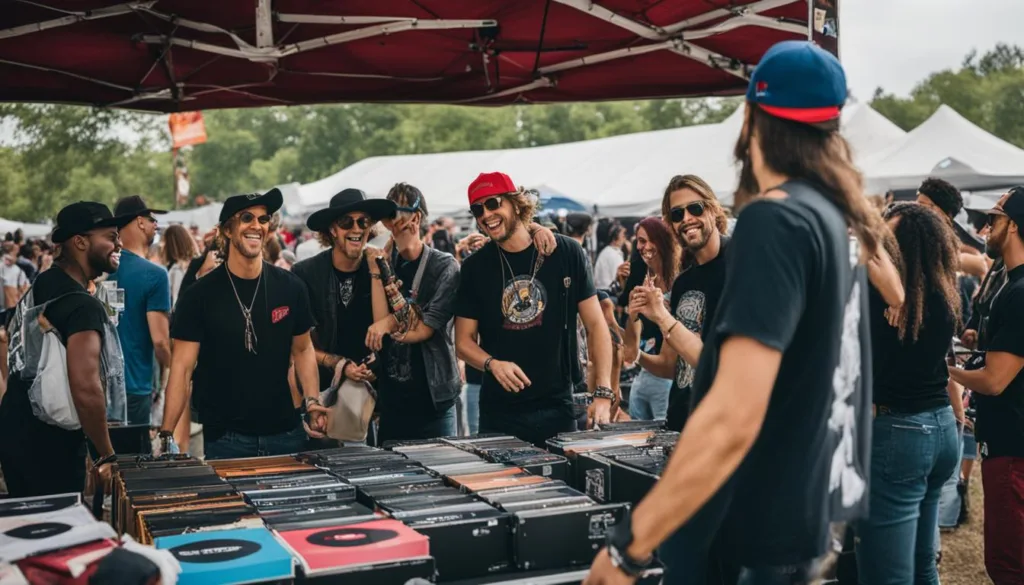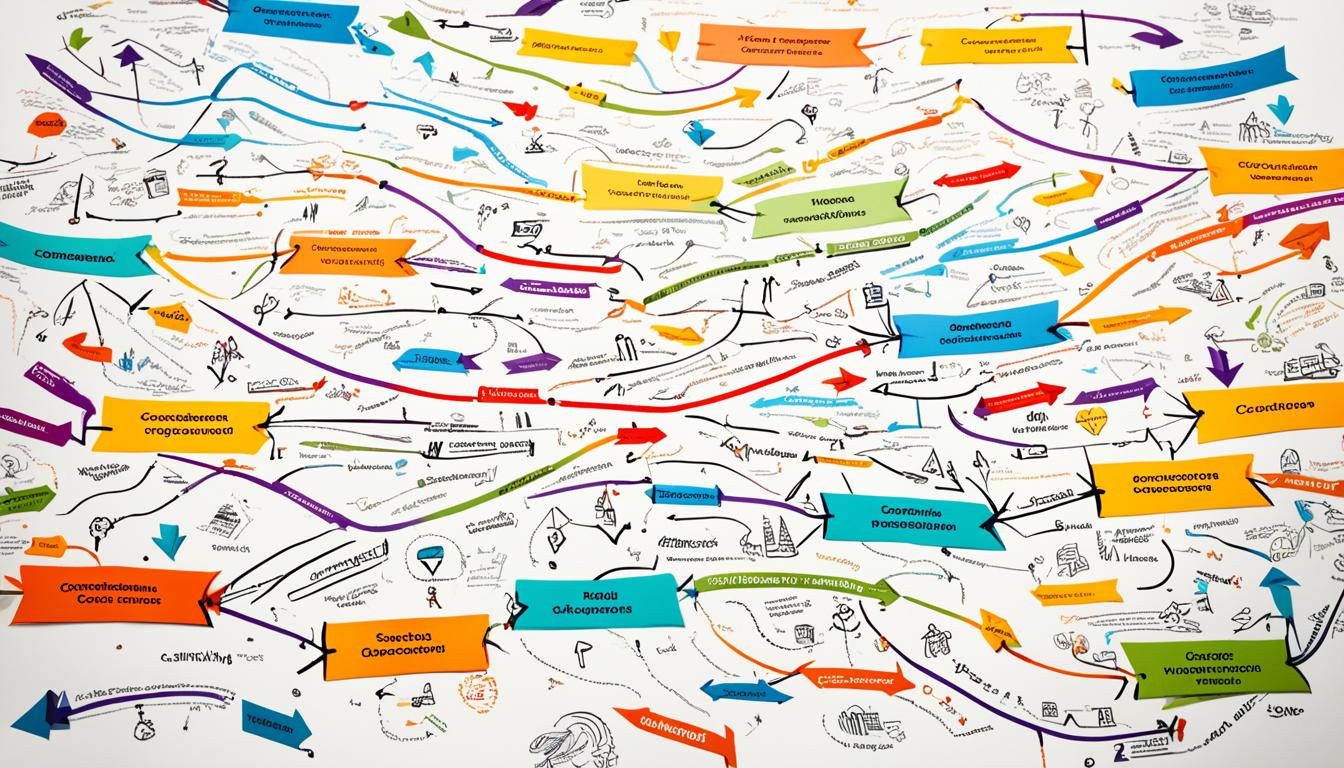If you’re a musician looking to supplement your income, there are plenty of side hustles in the music industry that you can explore. These side jobs for musicians can provide you with additional financial stability while allowing you to pursue your passion for music. Whether you’re a freelance musician or looking for part-time opportunities, there are various avenues you can explore to generate extra income.
In this article, I will discuss some of the best side hustles for musicians in 2024. From selling music online to social media monetization, there are plenty of opportunities for musicians to explore. Let’s dive into the details and discover how you can maximize your earning potential as a musician.
Key Takeaways:
- Explore music licensing opportunities to sell your songs for use in films, TV shows, and ads.
- Set up an online merchandise store to sell band-related products.
- Consider venturing into the world of NFTs (Non-Fungible Tokens) to sell unique digital assets to your fans.
- Monetize your social media presence through brand partnerships, sponsored posts, and affiliate marketing.
- Consider diversifying your income streams by exploring crowdfunding, Patreon, music teaching, music streaming, and live performance opportunities.
Music Licensing
Music licensing is a lucrative avenue for musicians to generate income by selling licenses for their songs to filmmakers, TV producers, and ad companies. There are two types of music licensing that musicians can pursue, depending on the size of their music catalog and the genre of their songs. Sync licensing involves production companies paying a fee to re-record the original track, while master use licensing requires a one-time fee to use the original recording.
Registering your songs with a performance rights organization (PRO) is essential to ensure that you receive payment when your music is played on various platforms. PROs collect royalties on behalf of musicians and distribute them accordingly. Additionally, music libraries act as intermediaries, connecting musicians with opportunities to license their music for use in various media such as films, commercials, and television shows.
“Music licensing provides musicians with a unique way to monetize their creativity beyond traditional revenue streams. By licensing their music to different forms of media, musicians can reach a wider audience and establish additional income streams.”
Benefits of Music Licensing
One of the key benefits of music licensing is the potential for increased exposure. When your music is featured in films, commercials, or television shows, it reaches a broader audience, potentially leading to new fans and increased recognition for your work. Furthermore, licensing your music can result in a steady stream of income, as your songs continue to generate revenue through licensing deals and royalties.
Music licensing also allows musicians to diversify their income streams. Instead of relying solely on album sales or live performances, licensing deals provide a consistent source of revenue that can support musicians’ careers in the long term. Moreover, licensing your music can open doors to new opportunities, such as collaborations with filmmakers, producers, and brands.
Overall, music licensing is a valuable avenue for musicians to explore. By leveraging their creative assets and partnering with PROs and music libraries, musicians can tap into the vast market of media production, expanding their reach, and generating additional income.
Selling band merchandise: Boost your income and connect with fans

As a musician, finding ways to generate additional income and engage with your fans is crucial. One highly effective method is selling band merchandise. Not only does it provide a financial boost, but it also allows you to strengthen your connection with your audience through tangible products that represent your brand.
Setting up an online merch store is easier than ever with platforms like Shopify. You can showcase and sell a variety of products, from t-shirts and hoodies to accessories and limited edition collectibles. The key to success lies in creating compelling merchandise designs that capture the essence of your music and resonate with your fans.
Designing unique merchandise that stands out
Merchandise design plays a crucial role in attracting customers and setting your brand apart from the competition. Collaborating with talented graphic designers or artists can help you create eye-catching designs that align with your music’s aesthetic. Incorporating your logo, album artwork, or lyrics can make the merchandise feel more personal and exclusive to your fans.
Additionally, utilizing print-on-demand apps can simplify the manufacturing and shipping processes. These apps enable you to fulfill orders on-demand, eliminating the need for inventory management and reducing upfront costs. This allows you to focus on what you do best – making music – while ensuring your fans receive high-quality products in a timely manner.
Selling band merchandise is not just about making money; it’s about creating a sense of community and loyalty among your fans. When they proudly wear or use your merchandise, they become ambassadors for your brand, spreading the word and attracting new listeners. By investing time and effort into your merch store, you can unlock a powerful revenue stream and deepen your connection with your audience.
NFTs (Non-Fungible Tokens)

NFTs are revolutionizing the way musicians can monetize their creativity by selling unique digital assets directly to their fans. With the advent of blockchain technology, musicians now have the ability to mint NFTs, which are one-of-a-kind tokens that represent ownership of a specific digital item, such as a new audio recording or exclusive album artwork.
By leveraging NFTs, musicians can tap into a growing market of collectors and enthusiasts who are eager to support their favorite artists and own a piece of their digital legacy. These unique digital assets can be traded and sold on reputable NFT platforms like OpenSea.io, providing musicians with a new avenue for generating income and connecting with their audience on a deeper level.
Minting NFTs and choosing reputable platforms
When minting NFTs, musicians should carefully consider the platforms they choose to host their digital assets. It’s important to select reputable platforms that have a track record of security and transparency in order to protect both the artist and the buyer. By conducting thorough research and due diligence, musicians can ensure they are using a platform that aligns with their values and provides a safe environment for their fans to engage with their creations.
By embracing NFTs and showcasing their unique digital assets, musicians have the opportunity to diversify their income streams and create a closer connection with their fans. This innovative technology opens up new possibilities for revenue generation and empowers musicians to take control of their financial destiny in an ever-evolving digital landscape.
The future of NFTs in the music industry
As NFTs continue to gain traction in the music industry, we can expect to see even more innovative use cases and opportunities for musicians to explore. From limited edition releases to virtual concerts and interactive digital experiences, NFTs have the potential to reshape the way music is created, consumed, and valued.
While the NFT market is still relatively new and evolving, it’s clear that this technology has the power to empower musicians and reshape the traditional music industry. By embracing NFTs and staying informed about the latest trends and developments, musicians can position themselves at the forefront of this digital revolution and unlock new avenues for success and creativity.
Social Media Monetization
Social media platforms have become a powerful tool for musicians to monetize their content and reach a wider audience. With the right strategies in place, musicians can generate income through various avenues on platforms like TikTok, Instagram, and YouTube.
One of the primary ways musicians can make money through social media is by earning royalties when their music is used in videos. This can be particularly lucrative on platforms like TikTok, where songs can go viral and reach millions of users. By strategically promoting their music on social media, musicians can increase their chances of gaining exposure and earning royalties.
Another avenue for social media monetization is through brand partnerships and sponsored posts. Many brands are eager to collaborate with musicians who have a strong social media following. By promoting products and services that align with their brand and values, musicians can earn money through sponsored content. Additionally, musicians can explore affiliate marketing opportunities, earning a commission on sales made through their social media posts.
Maximizing Social Media Monetization Strategies
To maximize their earnings through social media, musicians should focus on building a strong online presence and engaging with their audience. Posting consistently, responding to comments and messages, and creating high-quality content can help attract more followers and increase their monetization potential. Additionally, musicians should leverage analytics tools provided by social media platforms to gain insights into their audience demographics and preferences. This information can be invaluable in shaping their content and targeting their monetization efforts more effectively.
Conclusion
In conclusion, musicians have a wealth of side hustles available to them to supplement their income. Whether you are a songwriter, performer, or producer, there are various opportunities to explore in the music industry. These side jobs for musicians can provide you with financial stability while allowing you to pursue your passion.
From music licensing and merchandise sales to NFTs and social media monetization, the possibilities are endless. You can sell licenses for your songs to filmmakers and TV producers, set up an online merch store to sell unique band merchandise or create and sell NFTs of your music and artwork. Social media platforms also offer avenues for monetization through royalties, brand partnerships, and affiliate marketing.
Freelance gigs for musicians are also abundant. You can offer music lessons, provide live performances at events and venues, or even work as a session musician. Additionally, crowdfunding and platforms like Patreon allow your fans to support you directly and contribute to your creative endeavors.
It is crucial for musicians to diversify their income streams and tap into both traditional and digital platforms. By leveraging your skills and creativity, you can unlock new sources of revenue and financial stability. So, explore these part-time jobs for musicians and find the side hustle that aligns with your talents and goals. With determination and strategic planning, you can thrive in the music industry while enjoying a sustainable career.
FAQ
What is music licensing?
Music licensing involves selling a license for your songs to filmmakers, TV producers, or ad companies to use in their content. There are two different types of music licensing you can pursue depending on how large your music catalog is and what genre your songs fall into. Sync licensing requires production companies to pay a fee to re-record the original track, while master use licensing requires a one-time fee to use the original recording.
How can I register my songs with a performance rights organization?
Registering your songs with a performance rights organization ensures you get paid when your song is played on various platforms. You can choose an organization like ASCAP, BMI, or SESAC and follow their registration process to become a member. Once you’re a member, you can register your songs and collect royalties when they are played.
What are music libraries?
Music libraries connect musicians with opportunities to license their music for use in various media. These libraries work with production companies, ad agencies, and filmmakers to provide them with a catalog of music that they can use in their projects. Musicians can submit their music to these libraries and potentially earn licensing fees and royalties.
How can I sell band merchandise online?
Selling band merchandise is a great way for musicians to make extra income. You can set up a merchandise store with platforms like Shopify to sell products like t-shirts, water bottles, and canvas bags. Creating unique designs for merchandise and using print-on-demand apps simplify the manufacturing, shipping, and logistics processes.
What are NFTs and how can musicians use them?
NFTs (Non-Fungible Tokens) are unique digital assets traded using blockchain technology. Musicians can use NFTs to sell unique assets like music, artwork, and collectibles to their fans. They can mint an NFT to represent an asset and sell it on platforms like OpenSea.io.
How can musicians monetize their content on social media?
Social media platforms like TikTok and Instagram offer opportunities for musicians to monetize their content. Musicians can earn royalties when their music is used in videos on these platforms. They can also collaborate with brands through brand partnerships, sponsored posts, and affiliate marketing to generate additional income.
What are some other ways musicians can make money?
Musicians can explore other income streams such as crowdfunding, Patreon, music teaching, music streaming platforms, and live performances. Crowdfunding platforms like Kickstarter and IndieGoGo allow musicians to raise funds for their projects. Patreon allows fans to support musicians with monthly subscriptions. Music teaching and live performances can also generate income for musicians.




